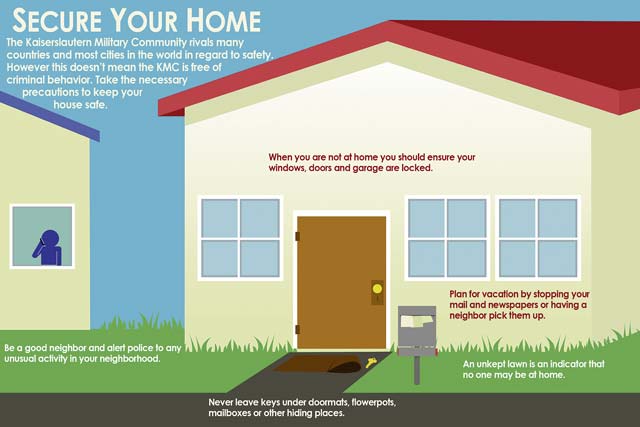
The KMC is known as a safe community overall. However, there are instances of crime affecting the homes and property of service members and their families. Because of this, it is necessary to know and practice safe habits in order to keep homes, valuables and family safe.
Staff Sgt. Elio Carrion, 569th U.S. Forces Police Squadron operations NCOIC, said many thefts and burglaries occur when valuables are left unsecured. Open windows or unlocked doors can attract unwanted visitors who search for easy opportunities to enter homes.
Situational awareness is key to keeping homes and valuables safe, said Staff Sgt. Joel Reyes Rodriguez, 569th USFPS police services NCOIC. In many cases of home burglaries, offenders monitor a house for some time and understand the homeowner’s schedule and habits.
“They learn your routine,” Rodriguez said. “They know when you leave for work and when you return, if you lock your door or if you don’t, or where you hide your spare key. They see all that, so it’s important to be aware of your surroundings.”
Homes become especially vulnerable when families leave town for an extended amount of time. Rodriguez said indicators, such as piled-up mail and overgrown lawns, can spotlight homes as potential targets. To prevent issues while on vacation, homeowners can invest in timed or motion sensor lights for their homes, or ask neighbors to collect mail and watch the house.
Homeowners must also be aware of potential schemes that may endanger their property. Rodriguez said homeowners should never let unknown solicitors into their homes. In some cases, sales people may have ulterior motives when they enter a house.
“They’re trying to pitch a sale, but really they’re scoping out the valuables in your house,” Rodriguez said. “One glance, and they see everything.”
Homeowners should never let solicitors enter their homes without certainty of legitimacy. Carrion said if a solicitor refuses to give the information of the parent company, there is a good chance he is not working lawfully.
Service members’ vehicles are at a higher risk for break-ins when there are indicators the owners are American.
“As Americans, we like to show off our cars,” Rodriguez said. “But having multiple bumper stickers or GPS devices in plain sight can make a vehicle a target.”
Carrion and Rodriguez agree that most service members’ vehicles that are broken into have these types of attention-attracting signs. Keeping a vehicle clear of noticeable indicators and making sure the vehicle is in a safe place may lessen the chance it will be spotted as a valuable target.
“When you get out of your vehicle, take an extra couple seconds to lock your car,” Carrion said. “Do a quick look-around, and if you see something suspicious, report it.”
In Germany, it is the law that vehicles remain locked when owners are not present. Failure to lock a vehicle may result in a ticket from German Polizei.
Carrion said one of the most effective ways service members can protect their homes and belongings is to establish relationships with neighbors.
“If you live off base, introduce yourself to all your neighbors, German and American,” Carrion said. “If you build a rapport, there’s a better chance your neighbors will report suspicious activity if they see it.”
For more information on crime prevention, visit www.facebook.com/kmcneighborhoodwatch or call the law enforcement desk at 0631-536-6060.


